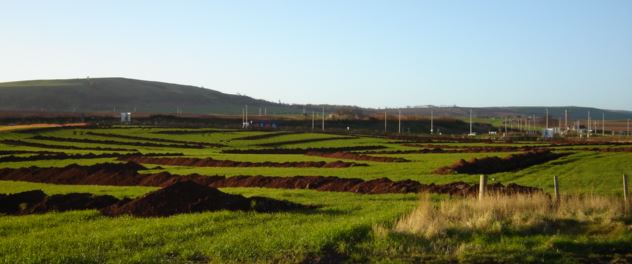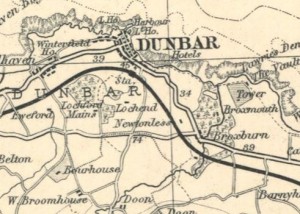ARCHAEOLOGY & PLANNING

 Archaeology & Planning (a quick guide) The Scottish Government’s policy on the historic environment and direction on relevant legislation is set out in the Scottish Historic Environment Policy (SHEP). In support of SHEP, Scottish Planning Policy (2010) and Planning Advice Note (PAN) 2/2011 provide guidance for planning authorities when determining planning applications which may affect the historic environment.
Archaeology & Planning (a quick guide) The Scottish Government’s policy on the historic environment and direction on relevant legislation is set out in the Scottish Historic Environment Policy (SHEP). In support of SHEP, Scottish Planning Policy (2010) and Planning Advice Note (PAN) 2/2011 provide guidance for planning authorities when determining planning applications which may affect the historic environment.
Additional relevant legislation includes the Planning (Listed Buildings and Conservations Areas) (Scotland) Act (1997), the Ancient Monuments and Archaeological Areas Act (1979) and the Town and Country Planning (Scotland) Act (1997). An archaeological condition will be attached to planning consent when the Planning Authority, as advised by their in-house archaeological consultant, considers there to be a significant probability that the application’s proposals may adversely impact on archaeological or built heritage remains.
The greater the archaeological potential the greater the possibility that the planning authority may require thatan archaeological assessment (desk-based and/or intrusive field evaluation) is undertaken before a planning application is considered. This pre-determination approach can be highly constructive for developers in reducing archaeological costs.
For any development the default objective of the planning authority will be to ensure the survival of archaeological sites by their preservation in situ or, when preservation in situ is not possible, by formal archaeological excavation followed by post-excavation analysis and publication of the results. If, for example, an evaluation undertaken at the outline planning stage unearths considerable archaeological remains, it may prove possible and financially attractive, to amend the proposals of the detailed planning application in allowing the survival of the newly discovered archaeology thus negating the need for a costly excavation.
Quite often the first a client (particularly with smaller developments) will know about an archaeological issue connected with their development is when they receive planning permission with a condition attached that requires ‘….the implementation of a programme of archaeological works in accordance with a written scheme of investigation…’. This standard statement, or something very like it, can leave the non-archaeologist confused as to what is required of them. ACCESS can liaise and negotiate on your behalf with the planning authorities
The Archaeological Process
 The practice of planning derived archaeology is founded on a phased process with early assessment phases (see consultancy services and evaluation fieldwork) informing the need (if any) for further archaeological requirement. Ideally we would recommend that archaeology is integrated at an early stage in planning any development, large or small. Recognition of the issues by prompt evaluation and working from an informed position, then planning and scheduling the archaeological or design response when undertaken early can lessen considerably the archaeological cost burden.
The practice of planning derived archaeology is founded on a phased process with early assessment phases (see consultancy services and evaluation fieldwork) informing the need (if any) for further archaeological requirement. Ideally we would recommend that archaeology is integrated at an early stage in planning any development, large or small. Recognition of the issues by prompt evaluation and working from an informed position, then planning and scheduling the archaeological or design response when undertaken early can lessen considerably the archaeological cost burden.
Providing Solutions
Whatever the size of a development project, or the stage it has reached, if archaeology is an issue we can help in finding a resolution. Minimize the risk of delays and increased costs.
 for a free consultation
for a free consultation

 Archaeology & Planning (a quick guide) The Scottish Government’s policy on the historic environment and direction on relevant legislation is set out in the Scottish Historic Environment Policy (SHEP). In support of SHEP, Scottish Planning Policy (2010) and Planning Advice Note (PAN) 2/2011 provide guidance for planning authorities when determining planning applications which may affect the historic environment.
Archaeology & Planning (a quick guide) The Scottish Government’s policy on the historic environment and direction on relevant legislation is set out in the Scottish Historic Environment Policy (SHEP). In support of SHEP, Scottish Planning Policy (2010) and Planning Advice Note (PAN) 2/2011 provide guidance for planning authorities when determining planning applications which may affect the historic environment.
 The practice of planning derived archaeology is founded on a phased process with early assessment phases (see consultancy services and evaluation fieldwork) informing the need (if any) for further archaeological requirement. Ideally we would recommend that archaeology is integrated at an early stage in planning any development, large or small. Recognition of the issues by prompt evaluation and working from an informed position, then planning and scheduling the archaeological or design response when undertaken early can lessen considerably the archaeological cost burden.
The practice of planning derived archaeology is founded on a phased process with early assessment phases (see consultancy services and evaluation fieldwork) informing the need (if any) for further archaeological requirement. Ideally we would recommend that archaeology is integrated at an early stage in planning any development, large or small. Recognition of the issues by prompt evaluation and working from an informed position, then planning and scheduling the archaeological or design response when undertaken early can lessen considerably the archaeological cost burden.